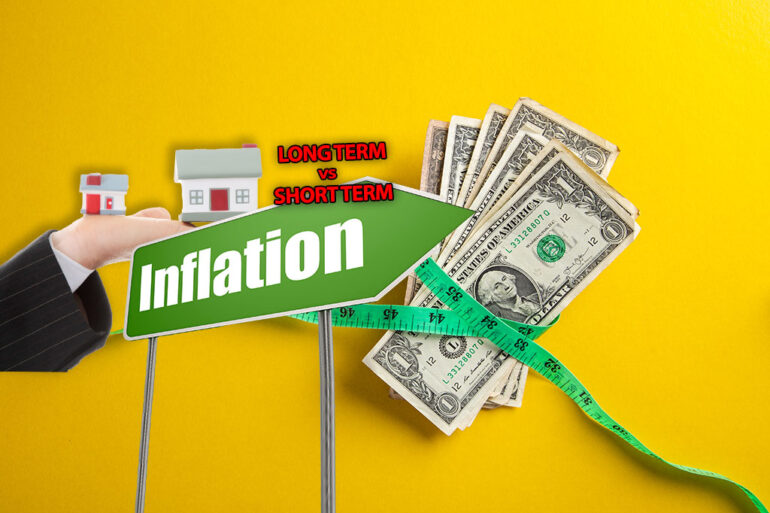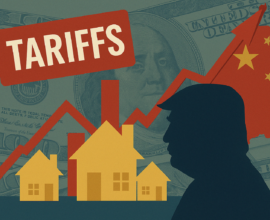Long-Term Inflation vs. Short-Term Inflation: How Does It Affect the Housing Market?
If you’re paying attention to the news, you’ve heard the word “inflation” thrown around. The COVID-19 pandemic has wreaked havoc on the global economy, and supply shortages have caused prices to rise across multiple industries, including the real estate market.
Buyers who are looking for homes right now are in a challenging position. Production delays mean new builds are taking longer than ever to complete, while material and labor prices continue to rise. The used housing market is made up of many shoppers fighting over an all-time low inventory of available houses. Rent prices are going up as well.
The current situation may seem favorable for real estate investors, but it isn’t as clear-cut as it might seem. The housing market may seem strong today, but it’s not immune to outside forces like inflation.
Here’s how inflation affects the housing market and your investments.
What Is Inflation Anyway?
Inflation describes the price increase consumers pay for goods and services over a set period of time. Usually, inflation is discussed in terms of a single year.
Short-term inflation is the rising costs of goods and services over a shorter period. In some cases, inflation can be measured by mere weeks or months. Long-term inflation, on the other hand, is the measurement of inflation over long periods of time.
Modest inflation is normal for a healthy economy. The United States has seen an average price increase of 1.8% over the last ten years. If you purchased a new couch a year ago for $200, that same couch would cost $203.60 today, based on the average inflation rate. The extra $3.60 may not seem like a lot, but it adds up, especially when you consider a larger purchase like a home or a car.
Appreciation vs. Inflation
Take note: inflation is not the same thing as appreciation. In the real estate market, appreciation is the increase of the property’s value over time. The value does not increase or decrease in relation to currency. Appreciation reflects the change of the asset itself, mainly because it’s more desirable or in demand.
Let’s say you own a rental property in a rough area of town. The houses’ worth and rental value will reflect a less-than-desirable neighborhood. Now the city decides to invest money into revitalizing the area. New businesses move in, and the neighborhood becomes a hotspot for young professionals and families.
Your property’s location makes it more desirable, which makes it easier to sell or rent the house for more money. Even if this market change takes a decade or more, this is an excellent example of appreciation.
While some forms of appreciation can come through improvements to the neighborhood, city, state, etc., another common form of appreciation is when you upgrade the property. That can include things like modern decorations, more efficient heating/cooling, or extra amenities like a deck or a pool.
Inflation can easily be confused with appreciation because the price of something goes up. Inflation is when the number of dollars necessary to purchase something increases. In regard to properties, inflation might drive up the price, but not because the house or location is actually worth more than it was. The dollars needed to purchase the property or pay for rent aren’t worth as much.
How Does Inflation Affect Real Estate?
Real estate investors with rental properties often see the greatest positives from times of inflation as rental prices are likely to go up. Inflation often means mortgage rates increase, which makes it more difficult for buyers. They turn to rental properties, which increases demand and thus increases rental prices.
High mortgage rates can be a massive negative for investors looking to secure funds for property purchases, renovation/improvement costs, etc. Banks are less likely to risk during high inflation times, so they charge higher interest rates and approve fewer loans.
Investors who focus on vacation rentals might find that inflation periods hurt the short-term rental market. As money gets tight, people are less likely to travel or pay for vacation homes.
What If Mortgage Rates Are Low?
While periods of inflation most often result in higher interest rates, that’s not always the case. During the COVID-19 pandemic, mortgage rates were dropped significantly. With loans being more accessible, the number of homebuyers increased. This leads to greater competition for the low inventory of houses and greater profits for those selling their investment properties or flipped homes.
What Are the Best Investments During Inflation Periods?
While there are several factors that impact the viability of a real estate investment opportunity, there are some situations that tend to have better outcomes during inflation periods:
- Rental Properties: The price of rent tends to increase during inflation times. That means your residential, commercial, and multi-unit properties will bring in a higher return.
- Note Investing: When banks are offloading higher than normal quantities of notes, there is less competition. That leads to lower prices.
- Real Estate Investment Trusts (REIT): Trusts tend to follow the demands of the market. Investing in a REIT is a great way to distribute your capital across a more diverse set of assets.
Should I Buy an Investment Property During an Inflation Period?
If you’re considering getting started in real estate investing or are simply looking to increase your portfolio, the idea of purchasing a new property might seem appealing. There are a few things to consider.
What will it cost to borrow money? Since inflation often leads to a rise in mortgage rates, it’s critical that you examine your lending options before jumping into a purchase contract.
Of course, if you already have capital lined up, you can skip the loan process and get right to making offers. If you do need to borrow money, make sure you are pre-approved and have some cash available for a down payment.
When housing inventory is low, competition is going to be high. That means you’ll have to compete with other buyers who want the same properties. You’ll be up against people making cash offers, waiving the appraisal/inspection, or offering to close rapidly. Sellers will have their pick of not just higher than normal prices but agreeable terms that make the process easier for them.
Since most homes will sell over listing price during these times, you might also have to adjust your budget or must-have list of features.
Should I Sell a Property During an Inflation Period?
If you’re looking to sell a home or property you already own during a time of inflation, making the sale should be reasonably straightforward. Inflation contributes to an increase in prices of properties for sale. Buyers tend to have to offer above the listing price and may even waive the appraisal or inspection to stand out.
The downside of selling during inflation is that you may have to spend more to prepare the property for sale. While inflation may cause house prices to increase, it can also impact the cost of materials, contractors, and other services used to get a house ready to show.
In some cases, property owners even forgo any kind of improvements or updates with the hope that buyers will still bid high to beat the competitive market.
Wrapping It Up
Periods of inflation create exciting opportunities for real estate investors, depending on the kind of investments they make. Those who are looking to sell or rent out a property are often in the best position. Inflation tends to cause the price of homes to increase. That means you can get a great return on your investment without necessarily doing anything to impact the property’s appreciation.
On the flip side of things, investors who are looking to purchase properties during inflation periods may have a more challenging time securing affordable loans. Properties may also see a decline in value right after the market cools, which can be scary for investors looking to flip the home. If you purchase a home with the intention of keeping it for a while, you should see the property’s value recover after some time.
The important thing to remember is that long-term inflation is normal. That’s the reason your grandparents could buy a loaf of bread for a quarter. That means property values are set to steadily increase over time. Short-term inflation can cause a rapid spike in property and rental prices.
Since it’s nearly impossible to predict when spikes will occur, it’s critical that investors have their finances in order to be in a strong position when the time is right. Otherwise, periods of inflation should lead investors to focus more on their rental properties, banknotes, and REITs to help weather the inflation storm.








